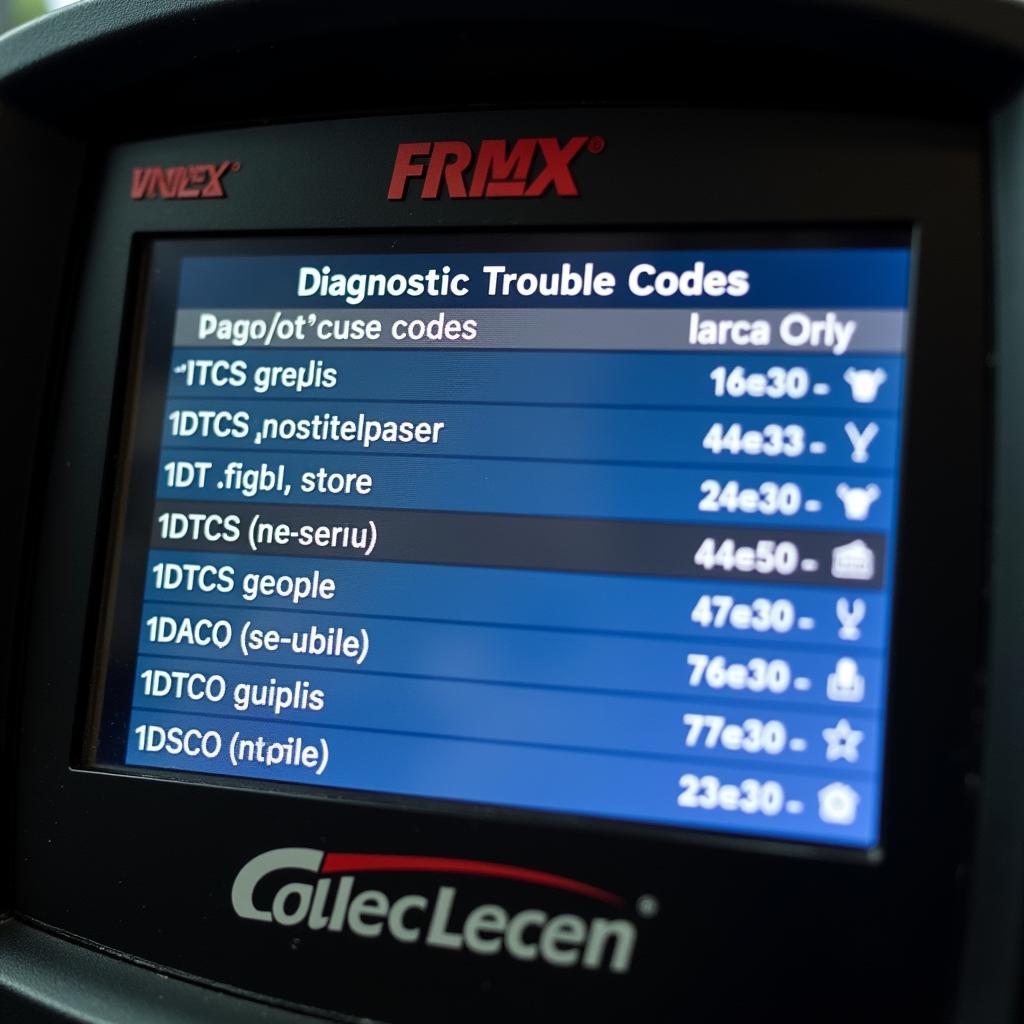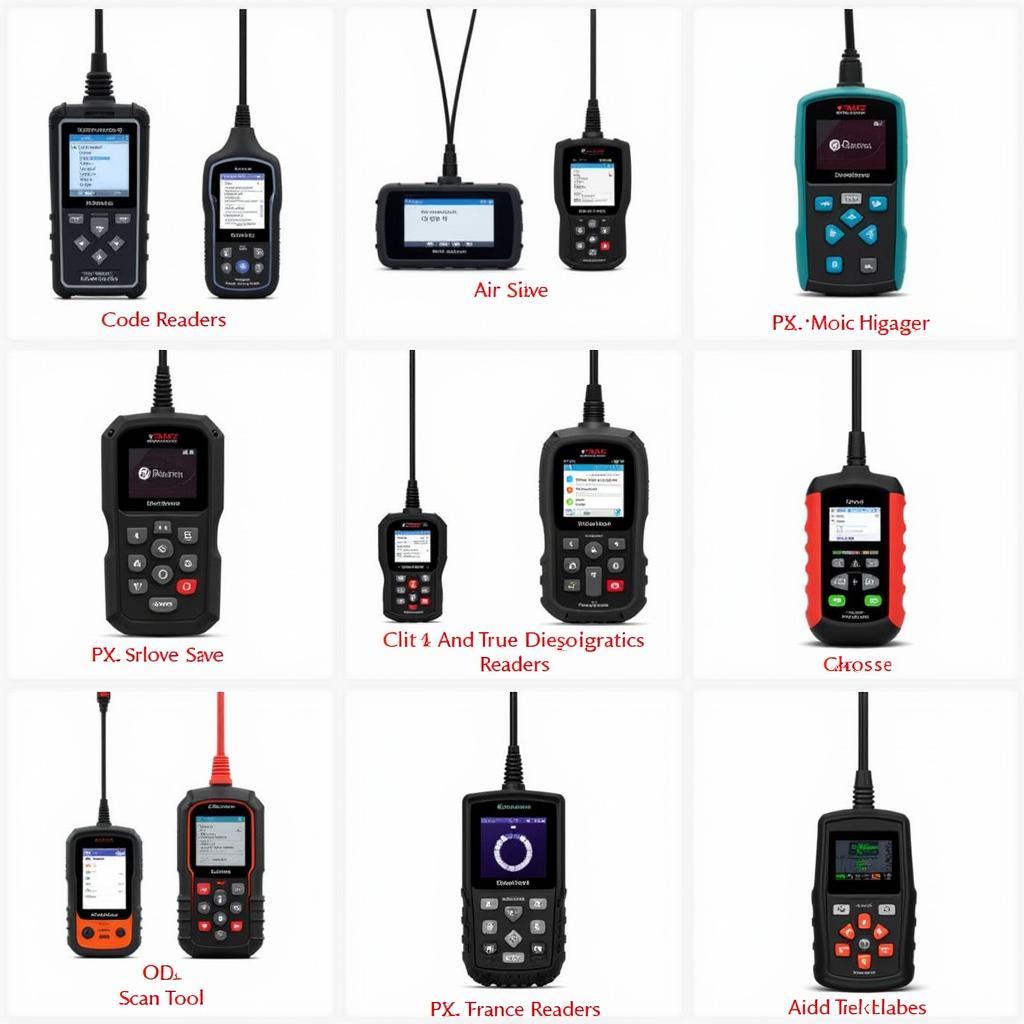Car Diagnostic Testers have revolutionized the way we troubleshoot and repair vehicles. No longer are we limited to educated guesses and time-consuming manual inspections. These powerful tools provide a direct line of communication with a car’s computer system, unlocking a wealth of information about its performance and health. Whether you’re a seasoned mechanic or a car enthusiast looking to take DIY repairs to the next level, understanding car diagnostic testers is essential in today’s automotive world.
How Car Diagnostic Testers Work: Demystifying the Technology
At the heart of every modern vehicle lies an intricate network of sensors and electronic control units (ECUs). These components continuously monitor various systems, from engine performance and emissions to airbag deployment and anti-lock brakes. A car diagnostic tester, often referred to as an OBD2 scanner, plugs into the vehicle’s standardized OBD-II port. This port, usually located under the dashboard on the driver’s side, acts as a gateway to retrieve and interpret the data collected by the car’s onboard computer.
Once connected, the car diagnostic tester can access Diagnostic Trouble Codes (DTCs). These codes are essentially standardized error messages that pinpoint specific areas where the vehicle’s performance deviates from pre-defined parameters. Each code corresponds to a particular issue, such as a faulty oxygen sensor, a misfiring cylinder, or even a loose gas cap.
 Car Diagnostic Tester Screen Showing DTCs
Car Diagnostic Tester Screen Showing DTCs
Benefits of Using Car Diagnostic Testers: Efficiency, Accuracy, and Empowerment
The advantages of incorporating car diagnostic testers into your automotive toolkit are numerous and impactful:
- Fast and Accurate Diagnosis: Car diagnostic testers eliminate the guesswork from troubleshooting, saving you valuable time and effort. By identifying the root cause of issues, they streamline the repair process and minimize unnecessary part replacements.
- Enhanced Repair Capabilities: Access to real-time data empowers you to perform more complex repairs with confidence. Whether you’re analyzing engine performance parameters or monitoring emissions levels, the insights provided by these tools enhance your understanding of the vehicle’s inner workings.
- Cost Savings: By pinpointing specific problems, car diagnostic testers can save you money on unnecessary repairs and reduce the risk of recurring issues. They also enable proactive maintenance, allowing you to address minor problems before they escalate into major expenses.
- Increased Vehicle Longevity: Regular use of car diagnostic testers facilitates preventive maintenance, ensuring your vehicle runs smoothly and reliably for years to come. By identifying and addressing minor issues promptly, you can prevent them from developing into significant problems that could shorten the lifespan of your car.
Choosing the Right Car Diagnostic Tester: Navigating the Options
The market offers a wide range of car diagnostic testers, from basic code readers to professional-grade scan tools. To make an informed decision, consider your specific needs and budget:
- Basic Code Readers: Home car diagnostic testers are ideal for casual users who want to read and clear basic DTCs. They are budget-friendly and user-friendly, making them a great entry point into the world of car diagnostics.
- Mid-Range Scan Tools: For DIY enthusiasts and hobby mechanics, mid-range scan tools offer a wider range of features, including live data streaming, advanced sensor readings, and compatibility with multiple vehicle makes and models.
- Professional-Grade Scan Tools: As the name suggests, professional-grade scan tools are designed for experienced mechanics and automotive professionals. They provide comprehensive diagnostic capabilities, including bi-directional controls, module coding, and access to manufacturer-specific data.
 Various Car Diagnostic Tester Models
Various Car Diagnostic Tester Models
Exploring Advanced Features: Beyond Basic Code Reading
As technology advances, car diagnostic testers continue to evolve, offering a growing list of sophisticated features:
- Live Data Streaming: This feature allows you to monitor real-time data from various sensors, such as engine RPM, coolant temperature, and oxygen sensor readings. This real-time information is invaluable for diagnosing intermittent problems and fine-tuning vehicle performance.
- Bi-Directional Controls: This advanced functionality enables you to interact with the vehicle’s systems by sending commands to specific components. For example, you can use bi-directional controls to cycle ABS solenoids, activate fuel injectors, or test various actuators.
- Module Coding: Certain car diagnostic testers offer module coding capabilities, which allow you to configure and program specific vehicle modules. This advanced feature is typically used by experienced professionals to customize vehicle settings, update software, and program replacement modules.
The Future of Car Diagnostics: Embracing the Digital Evolution
The automotive industry is rapidly evolving, with electric vehicles (EVs) and autonomous driving technologies taking center stage. This technological shift is also reflected in the world of car diagnostics:
- Cloud-Based Diagnostics: Cloud-based platforms are emerging as powerful tools for remote diagnostics and data analysis. Mechanics can access vehicle data, share diagnostic reports, and collaborate with experts from anywhere in the world, streamlining the repair process and improving efficiency.
- Predictive Maintenance: As vehicles become increasingly connected, car diagnostic testers will play a crucial role in predictive maintenance. By analyzing real-time data and historical trends, these tools can predict potential component failures before they occur, enabling proactive repairs and minimizing downtime.
Conclusion: Empowering Car Owners and Professionals Alike
Car diagnostic testers are indispensable tools in the modern automotive landscape. From basic code readers to sophisticated professional-grade scan tools, these devices empower car owners and professionals alike to diagnose and repair vehicles with greater efficiency, accuracy, and confidence.
Whether you’re a DIY enthusiast looking to tackle simple repairs or an experienced mechanic seeking to stay ahead of the technological curve, understanding and utilizing car diagnostic testers is essential for navigating the complexities of today’s vehicles. To explore a range of high-quality car diagnostic testers and discover the perfect tool for your needs, visit our car diagnostic tester price page.
FAQs about Car Diagnostic Testers
1. Are car diagnostic testers compatible with all vehicles?
Most modern vehicles (manufactured after 1996) are equipped with the standardized OBD-II port, making them compatible with a wide range of car diagnostic testers. However, certain older vehicles or models from specific manufacturers may require specialized adapters or scan tools.
2. Can I use a car diagnostic tester to reset my check engine light?
Yes, most car diagnostic testers allow you to read and clear Diagnostic Trouble Codes (DTCs), which will typically reset the check engine light. However, it’s important to address the underlying issue that triggered the code in the first place to prevent the light from coming back on.
3. What’s the difference between a code reader and a scan tool?
While the terms are often used interchangeably, there are some key differences. Code readers primarily focus on reading and clearing DTCs. Scan tools, on the other hand, offer more advanced features, such as live data streaming, bi-directional controls, and access to manufacturer-specific data.
4. Can I use a car diagnostic tester to program a new key fob?
Some advanced car diagnostic testers offer key programming capabilities, but this functionality varies depending on the specific tool and vehicle model. It’s essential to consult the user manual or contact the manufacturer to determine if your chosen tester supports key programming for your particular vehicle.
5. How often should I use a car diagnostic tester?
It’s recommended to use a car diagnostic tester whenever your check engine light illuminates or if you experience any unusual vehicle behavior. Additionally, periodic checks, even in the absence of warning lights, can help identify potential issues early on and facilitate preventive maintenance.
6. Can I learn to use a car diagnostic tester on my own?
Yes, many car diagnostic testers are designed to be user-friendly, even for those with limited automotive experience. Numerous online resources, tutorials, and user forums can provide valuable guidance on using these tools effectively.
7. Where can I find reliable car diagnostic testers?
DiagFixPro offers a wide selection of high-quality car diagnostic testers for both DIY enthusiasts and automotive professionals. Check out our comprehensive reviews and comparisons to find the perfect tool for your needs.
Need Expert Car Diagnostic Support?
Our team of certified technicians is here to assist you with all your car diagnostic needs. Whether you’re facing a persistent check engine light or need assistance interpreting complex DTCs, we’re here to help.
Contact us via WhatsApp: +1(641)206-8880 or Email: [email protected] for prompt and reliable support. Our customer service team is available 24/7 to answer your questions and provide expert guidance.

Leave a Reply